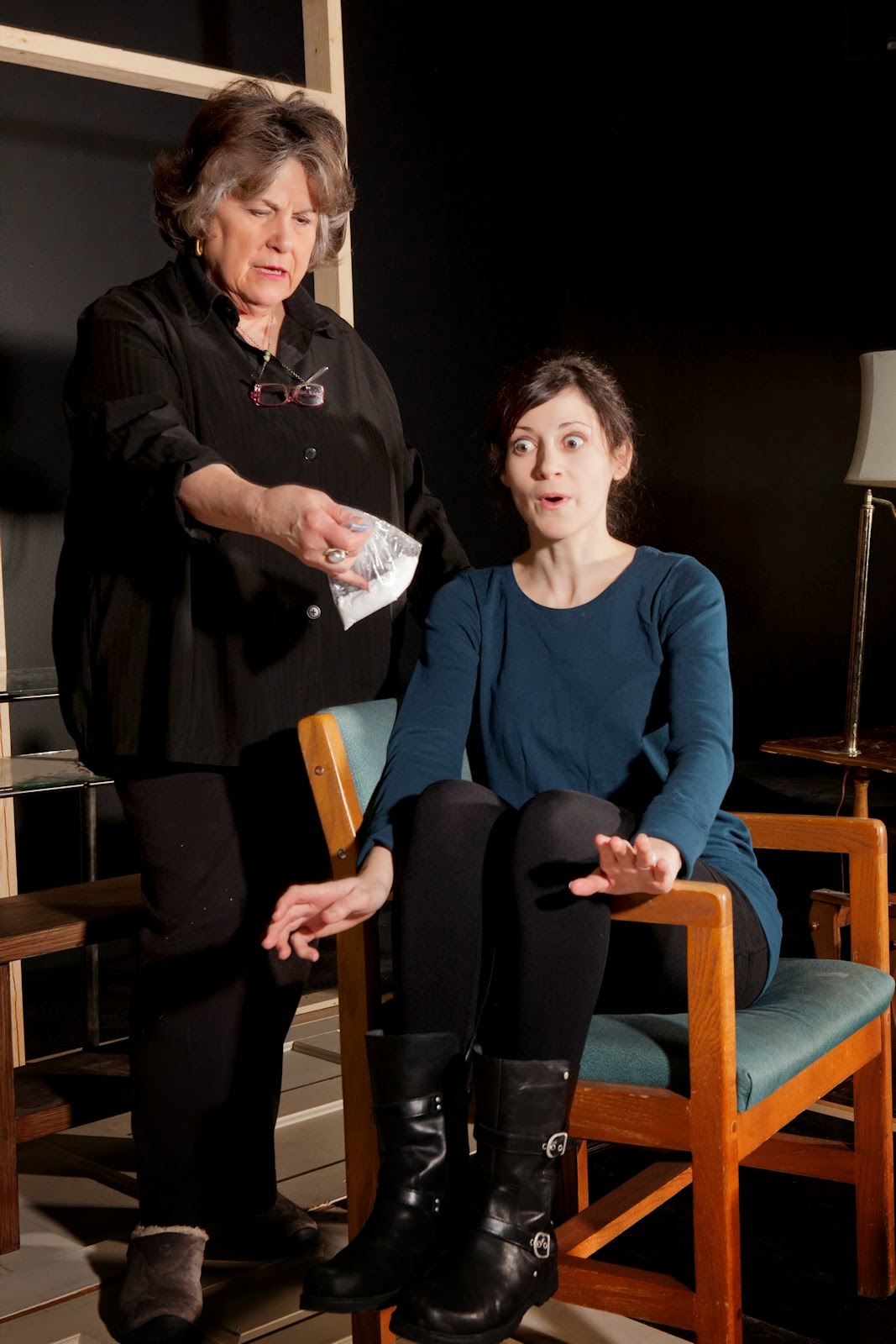Lungs - Fresh Voices
by Elizabeth Beck - Senior RMU
The first thing I thought when the lights came up at the end of the show was: That was an insane amount of words. This may not have been the most articulate thing to say, but ironically, Off the Wall’s latest opening, Lungs, is extremely eloquent.
I think the most mind-blowing part of this play is the mastery with which the two actors deliver the dialogue. It’s what keeps Lungs moving along, and in a ninety-minute show with absolutely no stopping and no obvious transitions, this is crucial. The sheer amount of words spoken throughout the play is astounding; the entire time, I was astonished at the fact that Sarah Silk, who beautifully portrays the complicated and endearing woman, had memorized it all. Watching Lungs, I felt as if I were stuck watching an impossibly long, circular argument that seems to be going somewhere—but as audience members, we can never be too sure where that “somewhere” is. The way that Silk and Alec Silberblatt portray their characters is the main reason behind this; I felt like I was watching a real couple argue in real time. Their chemistry plays a major role in the play’s believability. They have real concerns and real issues within their relationship, and it’s very intriguing and engaging to watch on stage.
We can all see bits and pieces of ourselves in these two characters—the insecurities of adulthood, the fragile (lack of) assurance in young relationships, the worrying about the problems of the world, and most of all, the fear that we cannot do what we believe we are meant to do, which is procreate and successfully raise another human being. I certainly saw a lot of myself in the woman in the show, but surprisingly, I identified with the man as well. The fact that the two characters transcend individual experiences, speaking to a much larger, collective reality, is a testament to just how good Silk and Silberblatt are in this show.
For a lot of the play, Silk’s character dominates the conversation. She talks in circles, at about 90 miles-per-hour, and with a cadence that makes you feel like she’s thinking out loud. It’s very believable (and unbelievable that she pulls it off so convincingly). Because of the female character’s volume, it’s hard to see the man in the relationship at first, but when he does come to the forefront, it’s impossible not to notice his struggle. Silberblatt delivers a very honest, relatable performance. At one point, when the woman is asleep, he opens up in a monologue about his inability to speak up in the relationship because he doesn’t know how to respond. That moment is so real and vulnerable, and I felt that in a lot of ways it was the highlight of the show. It reminds the audience that, while this man is in a relationship with a complicated and chaotic partner, it’s not that he’s being chivalrous by letting her talk—it’s that he doesn’t know how to voice his opinion. It also speaks volumes to the fragility of politics around female reproductive health. We put a lot of stress on the woman’s role in childbearing and, most of the time, the father fades to the background. But the man in Lungs will not be forgotten; he’s in the trenches just as fiercely as his girlfriend—and Silberblatt delivers it so skillfully.
But honestly, what I really liked—and related to most strongly—was the content of Lungs. This show really reaches out to the “baby-making generation,” i.e. the twenty and thirty-somethings that feel pressure from society’s expectations to marry and procreate because they’re of a certain age and that’s “just what people do." It’s easy for the older generations, the would-be grandparents, to pressure this age group to have kids, because when the baby-boomers had kids, the world was a little less scary than it is now. As millennials, we face a world that seems all too crowded with social and cultural issues. Everywhere we turn, there is a war, a protest, a new disease, and—as is one of the prominent issues in this play—a dying planet. Most of us don’t want to say it, but Lungs does: maybe it’s not the best idea to have kids.
I think Lungs is a play for everyone, regardless of age, demographic, culture, gender, or whatever else you’d like to insert. Because it’s just so damn relevant.
 |
| Sarah Silk - Alec Silberblatt Photo: Heather Mull |
I think the most mind-blowing part of this play is the mastery with which the two actors deliver the dialogue. It’s what keeps Lungs moving along, and in a ninety-minute show with absolutely no stopping and no obvious transitions, this is crucial. The sheer amount of words spoken throughout the play is astounding; the entire time, I was astonished at the fact that Sarah Silk, who beautifully portrays the complicated and endearing woman, had memorized it all. Watching Lungs, I felt as if I were stuck watching an impossibly long, circular argument that seems to be going somewhere—but as audience members, we can never be too sure where that “somewhere” is. The way that Silk and Alec Silberblatt portray their characters is the main reason behind this; I felt like I was watching a real couple argue in real time. Their chemistry plays a major role in the play’s believability. They have real concerns and real issues within their relationship, and it’s very intriguing and engaging to watch on stage.
We can all see bits and pieces of ourselves in these two characters—the insecurities of adulthood, the fragile (lack of) assurance in young relationships, the worrying about the problems of the world, and most of all, the fear that we cannot do what we believe we are meant to do, which is procreate and successfully raise another human being. I certainly saw a lot of myself in the woman in the show, but surprisingly, I identified with the man as well. The fact that the two characters transcend individual experiences, speaking to a much larger, collective reality, is a testament to just how good Silk and Silberblatt are in this show.
For a lot of the play, Silk’s character dominates the conversation. She talks in circles, at about 90 miles-per-hour, and with a cadence that makes you feel like she’s thinking out loud. It’s very believable (and unbelievable that she pulls it off so convincingly). Because of the female character’s volume, it’s hard to see the man in the relationship at first, but when he does come to the forefront, it’s impossible not to notice his struggle. Silberblatt delivers a very honest, relatable performance. At one point, when the woman is asleep, he opens up in a monologue about his inability to speak up in the relationship because he doesn’t know how to respond. That moment is so real and vulnerable, and I felt that in a lot of ways it was the highlight of the show. It reminds the audience that, while this man is in a relationship with a complicated and chaotic partner, it’s not that he’s being chivalrous by letting her talk—it’s that he doesn’t know how to voice his opinion. It also speaks volumes to the fragility of politics around female reproductive health. We put a lot of stress on the woman’s role in childbearing and, most of the time, the father fades to the background. But the man in Lungs will not be forgotten; he’s in the trenches just as fiercely as his girlfriend—and Silberblatt delivers it so skillfully.
But honestly, what I really liked—and related to most strongly—was the content of Lungs. This show really reaches out to the “baby-making generation,” i.e. the twenty and thirty-somethings that feel pressure from society’s expectations to marry and procreate because they’re of a certain age and that’s “just what people do." It’s easy for the older generations, the would-be grandparents, to pressure this age group to have kids, because when the baby-boomers had kids, the world was a little less scary than it is now. As millennials, we face a world that seems all too crowded with social and cultural issues. Everywhere we turn, there is a war, a protest, a new disease, and—as is one of the prominent issues in this play—a dying planet. Most of us don’t want to say it, but Lungs does: maybe it’s not the best idea to have kids.
I think Lungs is a play for everyone, regardless of age, demographic, culture, gender, or whatever else you’d like to insert. Because it’s just so damn relevant.



Comments
Post a Comment